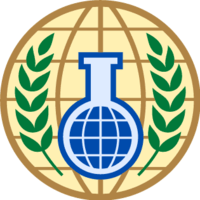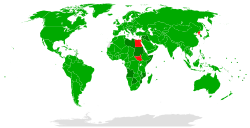
Back Organisation für das Verbot chemischer Waffen ALS منظمة حظر الأسلحة الكيميائية Arabic Kimyəvi Silahların Qadağan edilməsi Təşkilatı Azerbaijani Арганізацыя па забароне хімічнай зброі Byelorussian Арганізацыя па забароне хімічнай зброі BE-X-OLD Организация за забрана на химическите оръжия Bulgarian আন্তর্জাতিক রাসায়নিক অস্ত্র নিরস্ত্রীকরণ সংস্থা Bengali/Bangla Organització per la Prohibició de les Armes Químiques Catalan Organizace pro zákaz chemických zbraní Czech Organisationen for forbud mod kemiske våben Danish
 Logo of the OPCW | |
 Member states of the OPCW (green) | |
| Formation | 29 April 1997[1] |
|---|---|
| Headquarters | The Hague, Netherlands |
| Coordinates | 52°05′28″N 4°16′59″E / 52.091241°N 4.283193°E |
Membership | 193 member states (all states party to the CWC are automatically members. 4 UN Member States are non-members: Egypt, Israel, North Korea and South Sudan) |
Official languages | Arabic, Chinese, English, French, Russian, Spanish |
| Fernando Arias | |
Official organs | Conference of the States Parties Executive Council Technical Secretariat |
Budget | €71.74 million/year (2021) |
| Staff | approximately 500[2] |
| Website | www |
The Organisation for the Prohibition of Chemical Weapons (OPCW) is an intergovernmental organisation and the implementing body for the Chemical Weapons Convention (CWC), which entered into force on 29 April 1997. The OPCW, with its 193 member states, has its seat in The Hague, Netherlands; it oversees the global endeavour for the permanent and verifiable elimination of chemical weapons.
The organisation promotes and verifies the adherence to the Chemical Weapons Convention, which prohibits the use of chemical weapons and requires their destruction. Verification consists both of evaluation of declarations by member states and onsite inspections.
The organisation was awarded the 2013 Nobel Peace Prize "for its extensive efforts to eliminate chemical weapons". Nobel Committee chairman Thorbjørn Jagland said, "The conventions and the work of the OPCW have defined the use of chemical weapons as a taboo under international law".
- ^ "Chemical Weapons – Organization for the Prohibition of Chemical Weapons (OPCW)". United Nations Office for Disarmament Affairs. Archived from the original on 13 October 2013. Retrieved 11 October 2013.
- ^ Cite error: The named reference
NTI1was invoked but never defined (see the help page).